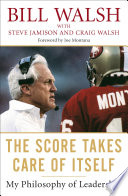

The Score Takes Care of Itself by Bill Walsh is a profound exploration of leadership and organizational success, drawing from Walsh's experiences as the head coach of the San Francisco 49ers. The book is structured aroun...
Continue readingThe foundation of a successful organization is a strong culture of accountability. In 'The Score Takes Care of Itself', Bill Walsh emphasizes the importance of personal responsibility among team members. Each individual ...
Continue readingWalsh argues that the key to success lies in focusing on the processes that lead to outcomes rather than fixating on the outcomes themselves. By concentrating on the execution of well-defined processes, teams can achieve...
Continue readingEffective leadership is rooted in a clear and compelling vision. Walsh emphasizes that leaders must articulate a vision that inspires and motivates their team. This vision serves as a guiding light, helping team members ...
Continue readingWalsh's success can be attributed to his unwavering attention to detail. He believed that the small things matter and that excellence is found in the details. This principle is evident in his approach to coaching, where ...
Continue readingBuilding a successful team requires more than just talent; it involves creating a cohesive unit that works well together. Walsh discusses the importance of selecting players who not only possess the necessary skills but ...
Continue readingIn a rapidly evolving environment, the ability to adapt to change is crucial for success. Walsh's career was marked by significant changes in the NFL, and he learned to embrace these shifts rather than resist them. He en...
Continue readingResilience is a key trait for both individuals and organizations. Walsh emphasizes the importance of maintaining a positive mindset in the face of challenges and setbacks. He shares personal stories of overcoming obstacl...
Continue readingThe reading time for The Score Takes Care of Itself depends on the reader's pace. However, this concise book summary covers the 7 key ideas from The Score Takes Care of Itself, allowing you to quickly understand the main concepts, insights, and practical applications in around 22 min.
The Score Takes Care of Itself is definitely worth reading. The book covers essential topics including Culture of Accountability, Focus on Process, Not Outcomes, Leadership Through Vision, providing practical insights and actionable advice. Whether you read the full book or our concise summary, The Score Takes Care of Itself delivers valuable knowledge that can help you improve your understanding and apply these concepts in your personal or professional life.
The Score Takes Care of Itself was written by Bill Walsh, Craig Walsh, Steve Jamison.
If you enjoyed The Score Takes Care of Itself by Bill Walsh, Craig Walsh, Steve Jamison and want to explore similar topics or deepen your understanding, we highly recommend these related book summaries:
These books cover related themes, complementary concepts, and will help you build upon the knowledge gained from The Score Takes Care of Itself. Each of these summaries provides concise insights that can further enhance your understanding and practical application of the ideas presented in The Score Takes Care of Itself.